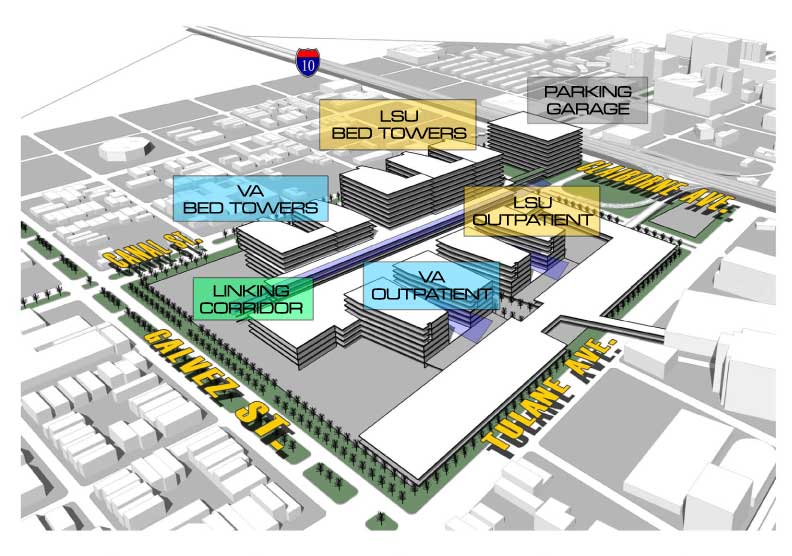 State, N.O. offer to buy land for veterans hospital
State, N.O. offer to buy land for veterans hospital
Downtown facility is considered a key factor in regional stability Wednesday,
May 02, 2007 By Kate Moran (Times-Picayune)
As the federal government searches the metro area for a place to build a new veterans hospital, the state and the city of New Orleans have offered to buy land west of Galvez Street to keep the facility downtown.
The city and state recently signed an agreement for the state to acquire the land -- by eminent domain if necessary -- and the city to reimburse whatever costs the Department of Veterans Affairs does not pay.
The partnership is an effort to retain the veterans hospital, an anchor of the downtown medical district, close to the Louisiana State University and Tulane medical schools and the new teaching hospital they plan to build. The old veterans hospital on Perdido Street has been closed since Katrina. The VA has been negotiating for months with LSU to build affiliated hospitals that would share laundry and laboratory services but not medical offices. That partnership seemed ready to splinter when the VA started looking in March for land anywhere in the metro area, including the suburbs, where it might build a new facility.
The city and the state have identified a possible site for the veterans hospital in the area bounded by Canal Street to the north, Tulane Avenue to the south and South Galvez and South Rocheblave streets on either side.
That parcel sits next to the 37 acres -- bounded by Canal, Tulane, Galvez and Claiborne Avenue -- where LSU plans to build a new teaching hospital to replace Charity Hospital, which closed after Katrina flooded its basement.
Mayor Ray Nagin called a news conference Tuesday afternoon to announce that the city and state had formed a partnership to keep the veterans hospital downtown, but he would not discuss key details of the plan, including where the hospital might be located or how much it might cost to buy the land.
Details about the location came from a cooperative endeavor agreement signed by the city and the state's Division of Administration -- a public document.
It was not clear from that agreement whether city and state would need to buy all 29 acres between Galvez and Rocheblave streets or only a portion of that land. Most of the property is residential.
The document says the state would acquire the property "by any means necessary" and transfer it to Veterans Affairs. It also says the city will reimburse the state for "actual costs" unless the VA kicks in money for the land.
Nagin would not discuss the potential cost of assembling small tracts of private property into a single parcel, but the state has earmarked $74 million to buy the adjacent 37 acres and hire architects to design the new LSU hospital.
Ed Blakely, the mayor's recovery czar, said the city could tap lines of credit to buy the land.
The VA recently initiated a public bidding process to identify potential plots to build the new hospital. Submissions were due by Monday, and it was not clear Tuesday whether the VA had received offers from agencies or landowners other than the city and state.
Debra Winbush, a spokeswoman for the VA in New Orleans, said the local agency did not have a list of agencies or landowners that had offered proposals and referred questions to Washington, D.C.
Nagin said other local governments supported the city in its efforts to keep the hospital in downtown New Orleans. Tom Capella, chairman of the Jefferson Parish Council, attended the news conference, as did Henry "Junior" Rodriguez, president of St. Bernard Parish.
"The growth of downtown New Orleans and the stability of the entire region relies on the continued clustered development of medical care and bioscience investment," Nagin said.
Caitlin Cain, an economic development program manager at the Regional Planning Commission, said at the news conference that her agency endorsed a resolution in March supporting the retention of the veterans hospital downtown.
Blakely said the veterans hospital should be situated in the city rather than the suburbs because the downtown area offers the best access to public transportation and the two medical schools.
Dr. Alan Miller, Tulane's associate senior vice president for health sciences, said keeping the veterans hospital downtown is "crucial for patients, faculty and the training of the future physicians of this region."
By identifying 29 acres where the VA could build its own hospital, Miller said the city is doing its best to ensure the project moves forward, whether or not the VA and LSU ever cement a partnership.